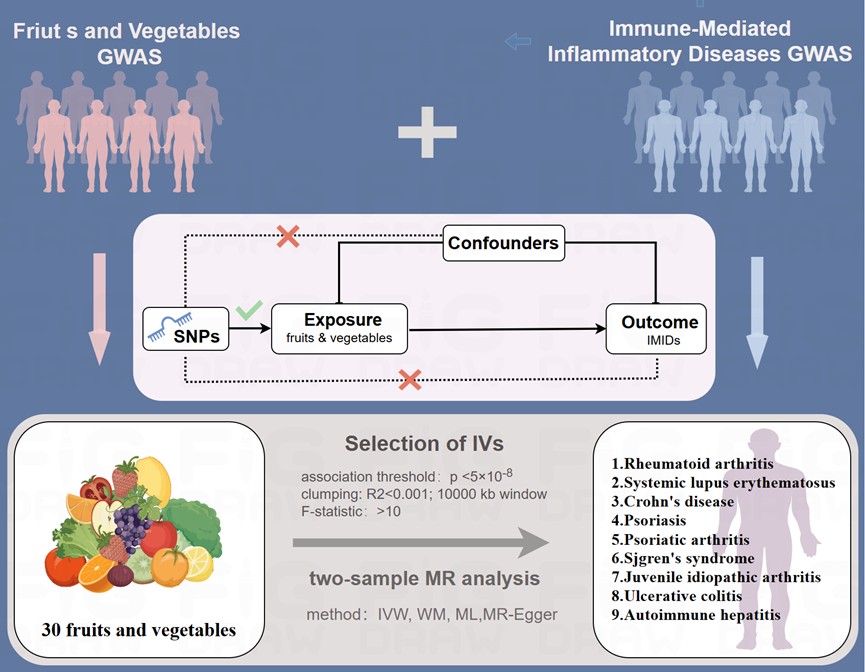Session Information
Session Type: Poster Session B
Session Time: 10:30AM-12:30PM
Background/Purpose: A balanced diet can prevent diseases and promote physical and mental health. Accumulating evidence shows that fruits and vegetables (F&Vs) intake is associated with immune-mediated inflammatory diseases (IMIDs). However, it remains uncertain whether there is causality between the two.
Methods: We comprehensively investigated the association between 30 types of F&Vs and IMIDs, using Dietary habits-Target Mendelian Randomization method. GWAS data on exposure and outcome factors were extracted from the IEU database. Ultimately, Steiger test was used to determine the direction of each SNP.
Results: A negative correlation was identified between cauliflower intake and the incidence of psoriasis (OR = 0.993, 95%CI 0.987-0.999, p = 0.016). Inversely, apple intake and onion intake promoted incidence of psoriatic arthritis (OR = 1.864, 95%CI, 1.237-2.809, p = 0.003) and Crohn’s disease (OR = 1.850, 95%CI 1.177-2.910, p = 0.008), respectively. Additionally, the findings were consistent across a range of alternative MR methods. Sensitivity analyses did not detect any heterogeneity or pleiotropy in the estimated impact of F&Vs on the risk of developing IMIDs (all p >0.05). Steiger proved that the causal relationship between them was true.
Conclusion: This is the first Dietary habits-Target Mendelian Randomization study to systemically examine the correlation between commonly consumed F&Vs and IMIDs. In conclusion, our findings showed that the intake of cauliflower alleviated psoriasis progression, whereas apple and onion intake promoted psoriatic arthritis and Crohn’s disease, respectively.
A graph illustrates the hypothetical impact of fruits & vegetables on IMIDs. The presence of a dotted line indicates a potential direct causal relationship or pleiotropic effect between fruits & vegetables on IMIDs.The two-sample MR study was analyzed using inverse variance weighted (IVW), weighted median (WM), maximum likelihood (ML), and MR-Egger. IMIDs, immune-mediated inflammatory diseases; MR, Mendelian randomization.
.jpg) Figure 1. Flowchart of the Mendelian randomization (MR) analysis.
Figure 1. Flowchart of the Mendelian randomization (MR) analysis.
.jpg) Figure 2. Multiple analysis of F&Vs and IMIDs. IVW, inverse-variance weighted method; WM, weighted median estimator; ML, maximum likelihood;AH, autoimmune hepatitis ; CD, crohn’s disease; JIA, juvenile idiopathic arthritis; PsA, psoriasis arthritis; PsO, psoriasis; RA, rheumatoid arthritis; SLE, systemic lupus erythematosus; SS, sjgren’s syndrom; UC, ulcerative colitis; F&Vs, fruits and vegetables; IMIDs, immune-mediated inflammatory diseases.
Figure 2. Multiple analysis of F&Vs and IMIDs. IVW, inverse-variance weighted method; WM, weighted median estimator; ML, maximum likelihood;AH, autoimmune hepatitis ; CD, crohn’s disease; JIA, juvenile idiopathic arthritis; PsA, psoriasis arthritis; PsO, psoriasis; RA, rheumatoid arthritis; SLE, systemic lupus erythematosus; SS, sjgren’s syndrom; UC, ulcerative colitis; F&Vs, fruits and vegetables; IMIDs, immune-mediated inflammatory diseases.
To cite this abstract in AMA style:
Tang X, Zhou Y, Chen Y, Wu X, Luo Q. Impact of Fruits and Vegetables Intake on Immune-mediated Inflammatory Diseases:a Two-sample Mendelian Randomization Study [abstract]. Arthritis Rheumatol. 2025; 77 (suppl 9). https://acrabstracts.org/abstract/impact-of-fruits-and-vegetables-intake-on-immune-mediated-inflammatory-diseases%ef%bc%9aa-two-sample-mendelian-randomization-study/. Accessed .« Back to ACR Convergence 2025
ACR Meeting Abstracts - https://acrabstracts.org/abstract/impact-of-fruits-and-vegetables-intake-on-immune-mediated-inflammatory-diseases%ef%bc%9aa-two-sample-mendelian-randomization-study/

